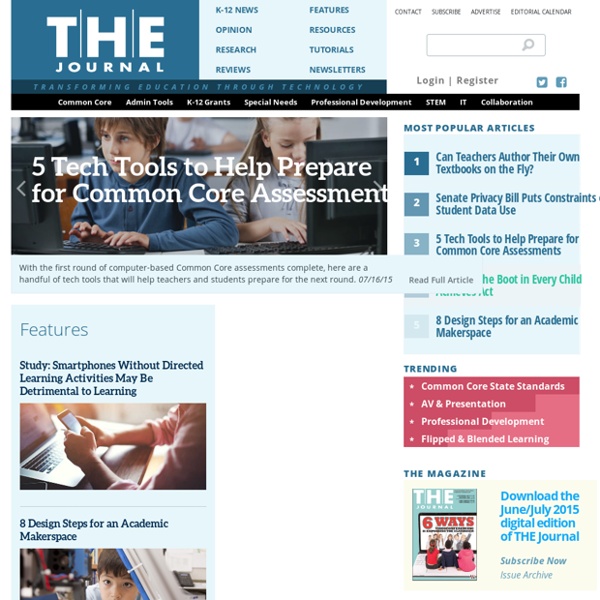



http://thejournal.com/Home.aspx
Journal of Computer Assisted Learning Special Issue of JCAL on: In recognition of the current interest in both learning analytics and massively multiuser environments and courses, contributions are being solicited for a special issue of JCAL addressing the intersection of these domains. It is clear that dialogue and exchange are needed to bring together the various contributory bodies of knowledge encompassed by the two domains, and one of the aims of the special issue will be to help encourage this. To this end, in addition to manuscripts reporting empirical investigations on the application of learning analytics to learning, teaching and assessment in MMVEs and MOOCs, those with a theoretical or conceptual focus will also be considered, with interdisciplinary studies and perspectives particularly sought after and welcomed. Proposal submission deadline extended until 7th October 2013
cellphones If you are interested in booking me (Wesley Fryer) for a presentation or workshop (either face-to-face or over video) please visit my Speaking page on www.speedofcreativity.org/speaking. Update 25 August 2010: In 2010 I am transitioning to the website wiki.wesfryer.com for my handout and presentation/workshop links.
Learning Journal I was tasked this week with creating a digital profile; what type of digital profile and how much to disclose or not to disclose was our choice. However, our choices were to be explained and supported. My response: When starting this project I began with trepidation, much the same approach I use with social media in general. I am naturally a private person and despise “small talk,” while at the same time relishing a good theoretical debate. Facebook is overwhelming for me, in that my mind has difficulty filtering all of the self-disclosure of mundane daily undertakings of a ridiculous number of acquaintances.
Piaget's Stages From Emerging Perspectives on Learning, Teaching and Technology Piaget's Stages of Cognitive Development Kay C. Wood, Harlan Smith, Daurice Grossniklaus Department of Educational Psychology and Instructional Technology, University of Georgia Introduction
International Journal of Learning Technology (IJLT This site uses some unobtrusive cookies to store information on your computer. By continuing to browse the site you are agreeing to our use of cookies. We use cookies to store sessions in order to provide an interactive and personal experience to our website users. Cellphones: Contraband or a Classroom Tool Text messaging has become one the fastest and most popular forms of communication. Just a few years ago, cell phones were seen as the newest teenage addiction. Today, however, they can be an important classroom tool, although some schools regard them as disruptive, distracting, and have implemented policies that prohibit using them on school grounds. Most parents are okay with cell phone use, the students are more than okay with cell phone use, yet schools have adopted zero tolerance policies. The reality is that students still use cell phones in school even if they are banned. According to the PEW Internet and American Life Research Project, 58% of teens from schools that forbid cellphones, use them during class anyway.
Improving Professional Practice:Moving to Evidence-Based Professional Practice Schools have recently begun to place increased emphasis on the use of rigorous research evidence in guiding instructional decisions. These efforts have been partly inspired by the No Child Left Behind Act's insistent call for the use of “scientifically based” research. As educators, however, we are driven by a much more powerful force than legislative mandates: We sincerely want to know that our actions will help students succeed. How can we harness the power of scientific research on behalf of the students we serve? What We Know
Most Cited Teaching and Teacher Education Articles Teacher self-efficacy and teacher burnout: A study of relations Volume 26, Issue 4, May 2010, Pages 1059-1069Einar M. Skaalvik | Sidsel Skaalvik The purpose of this study was partly to test the factor structure of a recently developed Norwegian scale for measuring teacher self-efficacy and partly to explore relations between teachers' perception of the school context, teacher self-efficacy, collective teacher efficacy, teacher burnout, teacher job satisfaction, and teachers' beliefs that factors external to teaching puts limitations to what they can accomplish. Participants were 2249 Norwegian teachers in elementary school and middle school. The data were analyzed by means of structural equation modelling using the AMOS 7 program.
Ten education blogs worth following Education blogs, on any and every topic, abound online. Unfortunately, educators are probably the last people who have the time to go out and search for them. Which blogs review good free resources? Which can offer information about school reform trends? Research for Practitioners: Can Text Messages (SMS) Support Learning? by Clark N. Quinn “We too often neglect meta-learning (learning to learn) strategies in our approaches. Having support for these strategies, in addition to all else we do for our learners, is likely to increase the learning outcomes.” Do you take the time to read through examples provided in learning experiences and explain to yourself why the author took each step? What the Heck Is Project-Based Learning? You know the hardest thing about teaching with project-based learning? Explaining it to someone. It seems to me that whenever I asked someone the definition of PBL, the description was always so complicated that my eyes would begin to glaze over immediately. So to help you in your own musings, I've devised an elevator speech to help you clearly see what's it all about. PBL: The Elevator Speech An elevator speech is a brief, one- or two-sentence response you could give someone in the amount of time it takes to go from the first floor to the second floor in an apartment building.